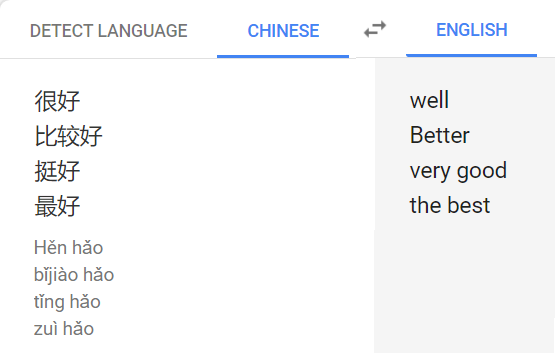Degrees of intensity with adjectives

In Chinese, you don’t just directly translate sentences like: “I am well” or “I am good”.
Adjectives like “good” always have adverbs attached to them to indicate the degree of intensity. There are several of these in use. Here are a few common ones:
我很好。(Wǒ hěn hǎo.) is literally “I very good”. I’m sure you’ve heard non-native English speakers from Asia use that sentence construction. Google Translate says “I am very good” but the “very” in this case is softer than it is in English.
我比较好。(Wǒ bǐjiào hǎo.) is literally “I comparatively good”. Google says “I am better”. 比较 (bǐjiào) is often used when comparing things. I often think of it as “relatively”.
我挺好。(Wǒ tǐng hǎo.) is again “I very good”. 挺 (tǐng) is very similar to 很 (hěn) but while in many cases, they can be used interchangeably, 挺 (tǐng) seems to get used more in oral language rather than written.
我最好。(Wǒ zuì hǎo.) is like “I most good”. This sentence would be more like “I’m the best”. A more common usage would be:
他是我最好的朋友。(Tā shì wǒ zuì hǎo de péngyǒu.) as “He is my best friend”.
2020-05-29
